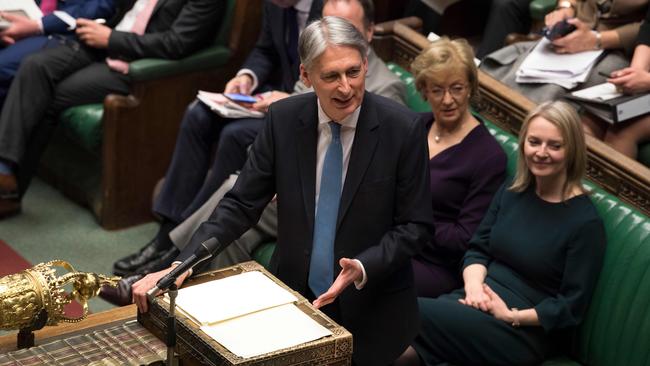Businesses left in limbo as Brexit woes mar the UK’s growth outlook
Ever since the Brexit referendum, businesses have pleaded with the British government to give them clarity for planning ahead.

Ever since the Brexit referendum, businesses have pleaded with the British government to give them clarity so that they can plan ahead.
Instead, just two weeks before Britain is scheduled to leave the EU, they have been presented with plans for the biggest overhaul of trading relations with the rest of the world in modern history, in the form of the proposed tariff schedules in the event of a no-deal Brexit.
With no opportunity for consultation, analysis or appeal, businesses have been told they may soon be hit with tariffs when exporting to the EU but will face competition from foreign rivals who will face no tariffs at all across 87 per cent of items imported to Britain.
It is an astonishingly cavalier way for any advanced economy to treat businesses which have already endured two years of uncertainty. It has taken a heavy toll on the economy, as British Chancellor Philip Hammond acknowledged recently when downgrading growth forecasts this year from 1.6 per cent to 1.2 per cent.
But the certainty businesses crave has never been an option with Brexit. Prime Minister Theresa May’s deal certainly didn’t offer it, which is why it has been the victim of two of the most crushing defeats in parliamentary history. It simply postponed all the most difficult decisions until after Britain had left the EU.
Had the deal got up on Wednesday (AEDT), a crisis might have passed, but new battlelines would have been immediately drawn up over who was to negotiate which of the “spectrum of options” available in the political declaration that is to form the basis of our future relationship with the EU. The uncertainty that her deal entailed proved its undoing.
Few MPs wanted to take responsibility for the trade-offs that choosing from that spectrum entailed, least of all Brexiteers, who know they would be blamed as the costs became clear. The only group to vote freely for the deal in any numbers were erstwhile Tory Remainers who were able to invoke the will of the people to absolve themselves of the verdict of history.
Where might businesses pin their hopes of certainty now that the Prime Minister’s deal has been defeated and the political system is in chaos? On the face of it, the best way out now appears to be a new deal involving a permanent customs union with the EU, which is what Labour claims to want, perhaps with added single market membership. That so-called Norway-plus model is backed by a cross-party group led by Conservative MP Nick Boles. But while a permanent Customs union might superficially address many business concerns, no one should be under any illusions that it will be easy to negotiate.
Membership of the Customs union is not straightforward, particularly if Labour wants a say over the EU’s future trade deals. Would the EU be willing to allow such a say? What form would it take? Would Britain be enrolled in all EU trade deals? Or would it have the right to pick and choose? How would disputes be resolved? Would Britain be willing to accept European Court of Justice rulings?
The Norway-plus element of the plan would be even more complicated, since this would require Britain to remain in the single market via membership of the European Economic Area. An agreement would need to be reached on free movement of people, a condition of EEA membership. Frictionless access to EU markets would also come at a price, the mechanism for calculating which would surely need to be agreed at least in principle in advance. If there are to be open borders, then the EU is also bound to insist on a deal on agricultural subsidies, which might end up tying Britain closely to something resembling the Common Agricultural Policy. Similarly, the EU would certainly demand a deal on fisheries as the price of a Norway-plus deal. Any deal would need to be agreed not just with the 27 EU countries but the four European Free-Trade Area countries too.
Meanwhile, there are broader political problems with Norway-plus. The first is that there is no chance that it could be negotiated in the few weeks that May has so far suggested she is willing to accept for an article 50 extension. It could not be delivered by merely tweaking the political declaration.
Besides, any deal would need to be ratified by the European parliament, whose last sitting day before it breaks for the European elections is April 18. That suggests that to have any chance, it would require a long extension.
Yet who would negotiate it, given that May has set herself firmly against it and many of her MPs may prefer to pull the rug on the government rather than support it? Could the cross-party MPs who back this idea provide a stable majority to back an alternative government, if necessary, for the months that it would take to negotiate, and the years it would take to implement? Would parliament be any more likely to back such a deal when the reality of turning Britain into a permanent EU rule-taker is laid bare? Would the EU even be willing to grant such a long extension to article 50 to negotiate such a plan given this would require Britain to participate in the European elections in June?
If parliament won’t back May’s deal and is serious about avoiding the disaster of a no-deal Brexit, it will need to come up with something more realistic than Norway-plus. All that is left is a second referendum.
The Times



To join the conversation, please log in. Don't have an account? Register
Join the conversation, you are commenting as Logout